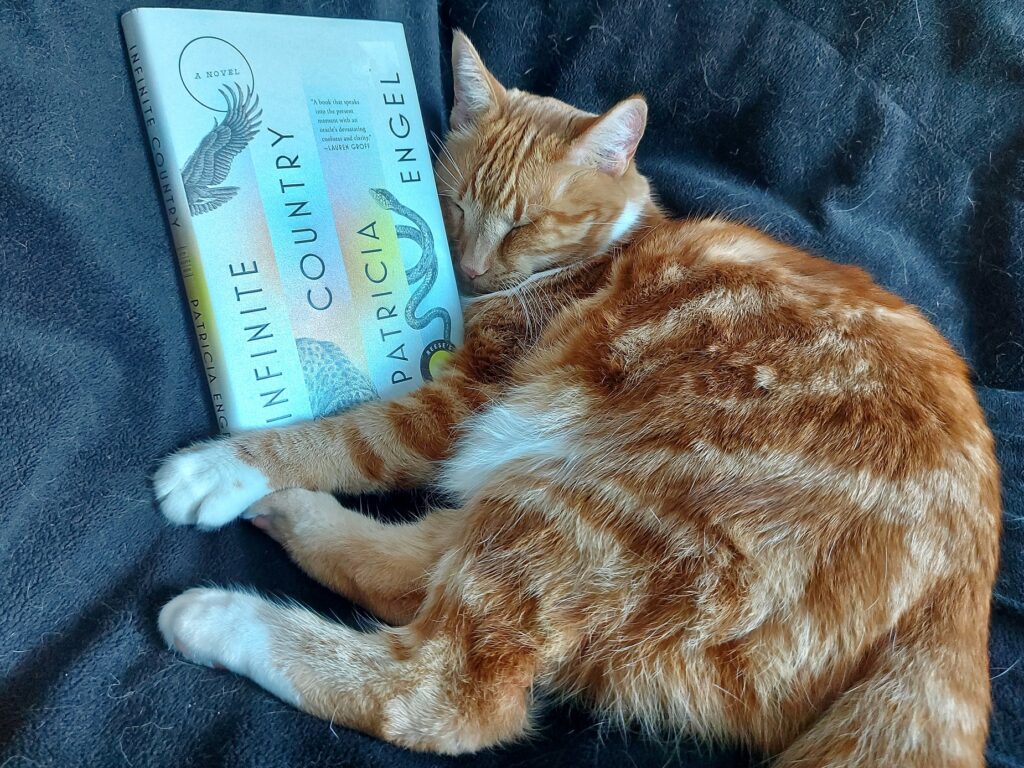Infinite Country by Patricia Engel

Infinite Country is a heartbreaking portrait of living undocumented in the US and of a family living in separate countries. The novel tells the story of 15-year-old American-born Talia, who has been raised by her abuela and her father, Mauro, in Colombia, and who must escape from a correctional facility so that she can fly to the US to be reunited with her mother, Elena, and her older siblings, Karina and Nando. Infinite Country also tells the story of how Talia’s parents ended up in the US, why her mother and siblings are still there, and why Mauro and Talia are on their own in Colombia. It explores why people immigrate to the US and how (white) Americans are so callous in their treatment of immigrants.
Mauro and Elena grew up in a Colombia in constant conflict between government forces and guerrilla groups. Mauro has the idea of him, Elena and Karina going to the US on tourist visas for six months so that they can work and make money to bring back to Colombia. They do intend to go back to Colombia when their visas expire, but then Elena becomes pregnant with Nando, and they decide to stay in the US because they want their son to have a better life than the ones they had in Colombia. They do this knowing that if they are caught in the US with expired visas, they will be deported and may never be able to go back to the US.
After a couple of years of living in the US, just when Elena is about to give birth to Talia, Mauro is arrested and deported back to Colombia. Elena initially considers going back to Colombia as well, but she changes her mind. She cannot get a job while she has a baby to take care of, so she gets a friend to take Talia back to Colombia to be raised by Elena’s mother with the intention of sending for Talia when she is a bit older. Since Talia is an American citizen by birth, she will be able to get back into the US.
However, Talia ends up staying in Colombia to help take care of her abuela until she dies. Talia is a good child and a good student, but she ends up at the correctional facility for assaulting a man with a pot of hot oil (I skipped over this part because the man kills a kitten ☹).
Infinite Country spans fifteen to twenty years of this family’s life, but it is a slim book. It does not go into great detail of their experiences in Colombia and the US but instead focuses on the feelings of the characters and the idea of “home” in the context of diaspora. Elena, who feels alone without Mauro and is also living with guilt after being raped by an employer, wonders why they even bothered going to the US as it is just as violent as Colombia, and because they also live in constant fear of being deported. Talia wonders if she even wants to go to the US. It is not her home, even if she was born there; her mother and her siblings do not feel like her family; and she feels guilty about leaving Mauro by himself in Colombia.
Infinite Country is mostly told in the third person, but there are a few chapters told from Karina and Nando’s first person perspective. It is a bit jarring to switch perspectives, but I appreciated that Karina and Nando had a chance to tell their stories. Nando may be an American, but he must put up with the bullying of his peers who, feeling emboldened by Trump’s presidency, beat him up for being brown. Karina is a top student in her grade, but she cannot go to an ivy league school as an undocumented immigrant. If she stays in the US, her fate will be like her mother’s, working cash in hand jobs for employers that take advantage of her undocumented status. The US does not feel like home for Karina, even though she has spent most of her life there, because she is not wanted in that country.
So why do people risk their lives to enter the US illegally? Why do they overstay their visas and live constantly looking over their shoulders to see if ICE is on their tails? Infinite Country cannot really answer this question. It seems that the idea of a better life in the US has been sold to everyone, and that it is the hope that they will one day have this better life that allows them to live with fear, hate and abuse.